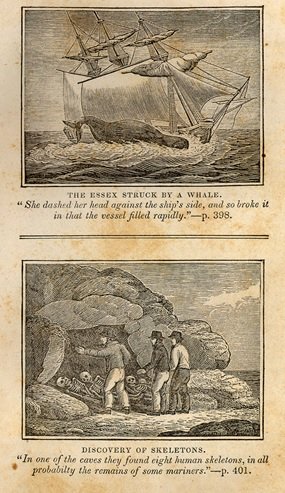We moved a lot when I was young. We weren’t military but my father was a federal employee so he took various assignments, mostly up and down the Eastern seaboard. No matter where we lived, we were never very far from the ocean. At times it was only a few steps — which was terrifying the afternoon Hurricane Gloria came through. I was only four. Other times, we were an hour’s drive. Even then our weekend excursions and family summer vacations almost always involved a trip to a seaside town. These were not lush beach resorts, but rather rocky-shored, salt-stained hard-scrabble fishing villages that smelled of lobster and barnacle.
It is this kind of seafaring town that Clark has set her story — and in the era of whaling merchant ships, and working lighthouses. The novel’s protagonist is fifteen-year old Mercy Rathbone, an uncommonly immature teenager for this mid-Victorian era. She lives in a cavernous house with her useless mother and elder cousin, Mordecai. Her only companions are a pair of crows that arrived via container. Her father — sailor, whaler, merchant — is lost at sea but occasional packages arrive from him from far off lands.

When her mother’s new boyfriend turns his attentions on Mercy, she enlists the help of Mordecai and the two decide to escape the grey, insular town. They shortly discover an island inhabited only by the past wives of Mercy’s father. These ancient women pass on their wisdom before sending the children off on an adventure.
The book employs elements of magical realism — Mercy’s crows, wives who at least a few hundred years old. It’s introduced as such, by a reminiscing Mercy, in the opening pages of the book.
It was a sometimes patchy tale, women from such thread as I found: oral histories passed down and with each step altered, unfinished ship logs, journals washed and bloated by the sea until little could be read. ~Loc 97 of 5138
Her voice loses its maturity as she relives the narrow scrapes of the story. Still, she has insights.
We are all descended from the fishes, Mordecai had once told me, and are still subject to the ocean’s tides. So I was not surprised, these three months later, when Mama’s mood changed, and her story ended not with the giants romping on the beach but gasping on the rocks, their livers coming and going. ~Loc 164 of 5138
This bizarre family lives in a gothic house strange passageways and corners.
Our house was built like a seaworthy ship. No space was wasted, each odd angle fitted with drawers, shelves, small spaces locked against light and vermin. A lingering fear of running our of stores far from land showed in its design. Each nook and cranny held stubs of ropes of ends of candles, small hoards of the hardtack that will keep a man alive at sea when the last salted beef and moldering oranges have gone. ~Loc 277 of 5138
Yet for all of this superb setting description, I didn’t enjoy this book very much. At times the writer became so coy that the fundamentals of what-the-heck-is-going-on got lost. In parts, it was a case of form over function and the story became secondary. I fully appreciate a writer who can show-not-tell, but too often this didn’t show or tell. If you are going to present a story with supernatural or unusual elements, the reader needs to have a good footing on which to imagine the rest of the tale. In short, it was atmospheric but not terribly solid.
Read via NetGalley. Available from Doubleday on August 6th.
_____________________________
Hardcover: 384 pages
Publisher: Doubleday (August 6, 2013)
Language: English
ISBN-10: 0385536933
ISBN-13: 978-0385536936
Product Dimensions: 9.2 x 6.4 x 1.5 inches


Sometimes I like magical realism and sometimes I don’t. The blurb from Erin Morgenstern on the front still makes me want to give this book a try, though!